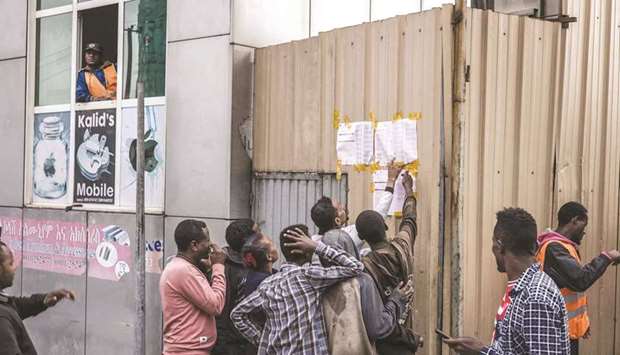Officials in Ethiopia counted ballots yesterday after a parliamentary election billed as the first free vote in the country’s history but marred by an opposition boycott, war and reports of irregularities in some areas.
Prime Minister Abiy Ahmed hopes the national and regional elections will show the success of democratic reforms he launched after being appointed by the ruling coalition in 2018.
But the vote also reflects a messy reality in the country of 109mn people.
Authorities could not hold polls on Monday in four of Ethiopia’s 10 regions, according to the election board.
Voters in one of those regions, Sidama, went to the polls a day late yesterday, due to logistical problems. War has displaced 2mn people in the Tigray region, where Abiy sent troops last November to battle regional authorities that once had dominated the federal government in Addis Ababa.
Residents said new fighting had flared in recent days north of regional capital Mekelle.
The Ethiopian military denied reports that fighters loyal to the former regional ruling party had entered several towns in the area. In a tweet yesterday, Abiy said: “All sections of society have gone out to cast their vote in our nation’s first free and fair election.” Late on Monday, he said in a statement: “Democracy is not built in a day. We are laying it brick by brick.”
Almost all polling stations in the capital had finished counting ballots, an electoral board spokesperson told reporters yesterday.
Abiy’s newly formed national Prosperity Party is widely forecast to defeat the fragmented opposition of dozens of mostly ethnically based parties.
The ruling coalition and its allies won all 547 national parliamentary seats in the last election under Abiy’s predecessor six years ago, at a time when Ethiopia was one of the most tightly controlled countries in Africa.
Though the prime minister won the Nobel prize in 2019 for making peace with neighbouring Eritrea, his international reputation has been tarnished since conflict erupted in Tigray, where he sent troops after accusing regional authorities of attacking army bases. The United Nations says a famine is looming after fighting between Ethiopia’s military and the region’s former governing party, the Tigray People’s Liberation Front (TPLF).No date has been set for elections in Tigray.
The main road north out of the regional capital has been closed for two days, a resident of Adigrat, a city to the north, told Reuters by phone. Yesterday morning, Tigrayan regional forces entered parts of Adigrat, leading residents to come out to celebrate near the Catholic archbishop’s office, before more Ethiopian and Eritrean soldiers came back into the city, the resident said.
A senior member of Tigray’s interim government, which was appointed by the federal government, said forces loyal to the TPLF had in the past 48 hours entered the towns of Wukro, Hawzen and Agula, all to the north of Mekelle.

Ethiopian voters look at tallies posted outside a polling station in Addis Ababa, yesterday.
